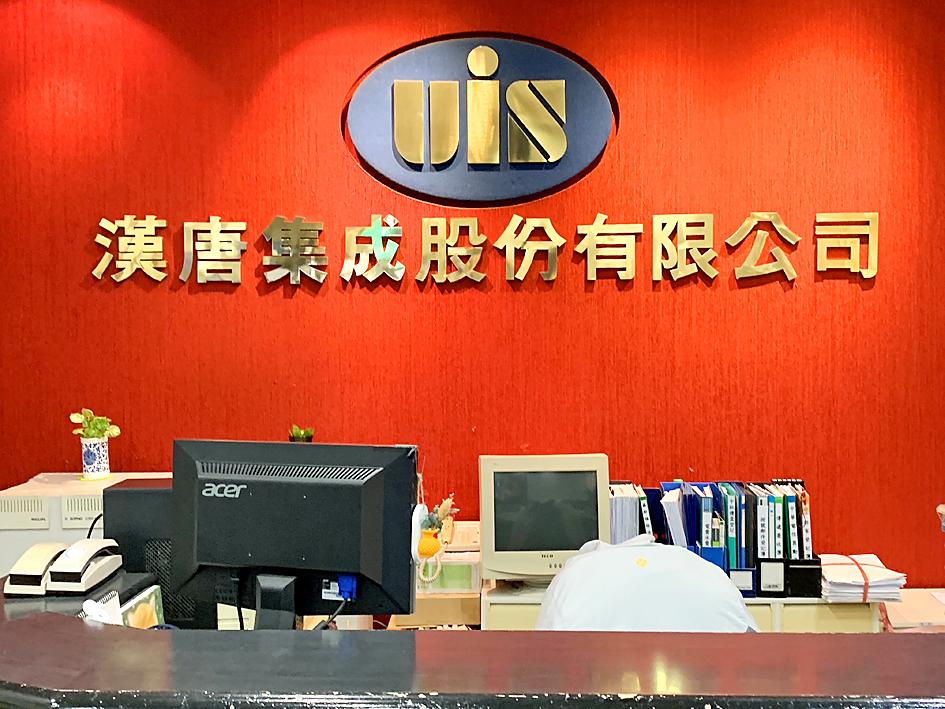United Integrated Services Co (UIS, 漢唐集成), which provides electric system integration engineering services, is part of a supply chain that is set to benefit from Taiwan Semiconductor Manufacturing Co’s (TSMC, 台積電) multiyear capacity expansion plans, despite weak sales and earnings growth so far this year, Yuanta Securities Investment Consulting Co (元大投顧) said on Friday.
Revenue in the first four months of this year declined 21.94 percent to NT$7.72 billion (US$278.49 million), from NT$9.89 billion a year earlier, UIS data showed.
Net profit in the first quarter was almost flat from last year, rising 0.15 percent to NT$746.88 million. That translated into earnings per share of NT$3.92.

Photo: Grace Hung, Taipei Times
“We remain positive on UIS given it has 70 percent to 80 percent order allocation from TSMC for clean room electrical and mechanical engineering services, and is thus a major beneficiary of its capacity expansion,” Yuanta analysts wrote in a research note.
UIS helps TSMC build manufacturing facilities, including the chipmaker’s advanced Fab 14, which produces 5-nanometer chips, and Fab 18, which is to begin volume production of 3-nanometer chips in the second half of next year.
In early April, TSMC announced that it would invest about US$100 billion to expand capacity and fund research and development over the next three years, in response to a lack of capacity in the supply chain and rising demand caused by the 5G and high-performance computing trends.
The chipmaker is planning several capacity expansion projects, including the P4 to P6 plants at Fab 18 and the P8 plant at Fab 14 in Tainan, the research and development center in Hsinchu County’s Baoshan Township (寶山) and a packaging plant in Miaoli County’s Jhunan Township (竹南), as well as a new plant at its Nanjing fab in China and the new Arizona fab in the US, Yuanta analysts said.
Apart from orders from TSMC’s new projects, Yuanta analysts said that UIS in the near term would benefit from capacity expansion at US-based DRAM chipmaker Micron Technology Inc’s fab in Taichung’s Houli District (后里) and Powerchip Semiconductor Manufacturing Corp’s (力積電) fab in Miaoli County’s Tongluo Township (銅鑼).
In the mid to long term, the company would gain support from an uptrend in the semiconductor equipment sector, as the US and China intend to build their own semiconductor supply chains at home, the analysts said.
UIS shares have risen 10.19 percent since the beginning of this year, trailing behind the bellwether electronics sector’s 13.71 percent increase and the TAIEX’s 16.39 percent advance over the same period.
The stock on Friday declined 1.24 percent to NT$238.
The company plans to pay out a cash dividend of NT$17 per share on June 26, representing a dividend yield of 7.14 percent.
Yuanta maintained its “buy” rating for UIS considering the stock’s attractive valuation and high dividend yield, but reduced its target price for the stock to NT$280, from NT$300 previously, as the company is facing slower than expected sales growth due to transitions from old projects to new ones, it added.

CHIP WAR: Tariffs on Taiwanese chips would prompt companies to move their factories, but not necessarily to the US, unleashing a ‘global cross-sector tariff war’ US President Donald Trump would “shoot himself in the foot” if he follows through on his recent pledge to impose higher tariffs on Taiwanese and other foreign semiconductors entering the US, analysts said. Trump’s plans to raise tariffs on chips manufactured in Taiwan to as high as 100 percent would backfire, macroeconomist Henry Wu (吳嘉隆) said. He would “shoot himself in the foot,” Wu said on Saturday, as such economic measures would lead Taiwanese chip suppliers to pass on additional costs to their US clients and consumers, and ultimately cause another wave of inflation. Trump has claimed that Taiwan took up to

A start-up in Mexico is trying to help get a handle on one coastal city’s plastic waste problem by converting it into gasoline, diesel and other fuels. With less than 10 percent of the world’s plastics being recycled, Petgas’ idea is that rather than letting discarded plastic become waste, it can become productive again as fuel. Petgas developed a machine in the port city of Boca del Rio that uses pyrolysis, a thermodynamic process that heats plastics in the absence of oxygen, breaking it down to produce gasoline, diesel, kerosene, paraffin and coke. Petgas chief technology officer Carlos Parraguirre Diaz said that in

SUPPORT: The government said it would help firms deal with supply disruptions, after Trump signed orders imposing tariffs of 25 percent on imports from Canada and Mexico The government pledged to help companies with operations in Mexico, such as iPhone assembler Hon Hai Precision Industry Co (鴻海精密), also known as Foxconn Technology Group (富士康科技集團), shift production lines and investment if needed to deal with higher US tariffs. The Ministry of Economic Affairs yesterday announced measures to help local firms cope with the US tariff increases on Canada, Mexico, China and other potential areas. The ministry said that it would establish an investment and trade service center in the US to help Taiwanese firms assess the investment environment in different US states, plan supply chain relocation strategies and

Japan intends to closely monitor the impact on its currency of US President Donald Trump’s new tariffs and is worried about the international fallout from the trade imposts, Japanese Minister of Finance Katsunobu Kato said. “We need to carefully see how the exchange rate and other factors will be affected and what form US monetary policy will take in the future,” Kato said yesterday in an interview with Fuji Television. Japan is very concerned about how the tariffs might impact the global economy, he added. Kato spoke as nations and firms brace for potential repercussions after Trump unleashed the first salvo of